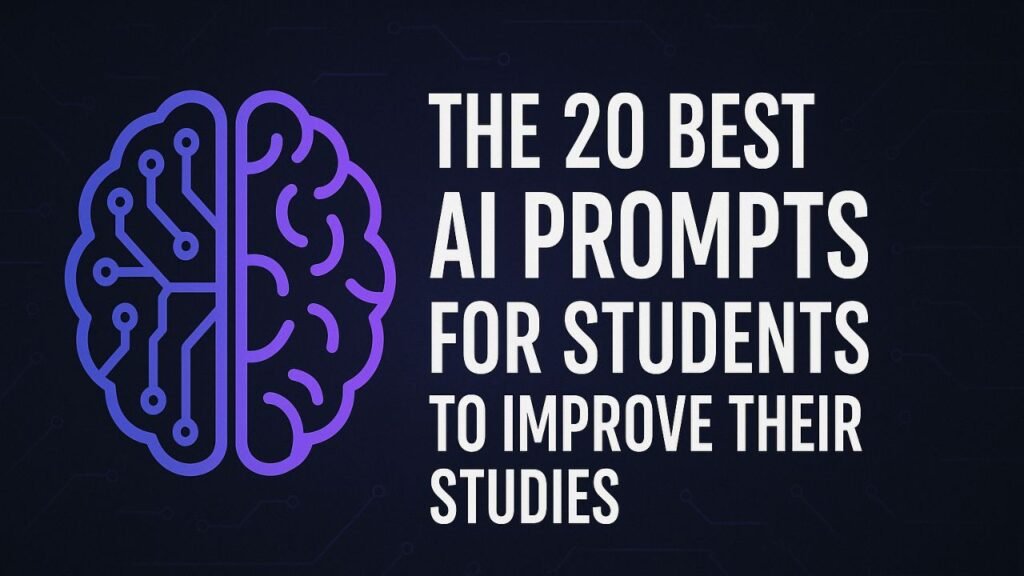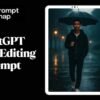Feeling overwhelmed by mountains of textbooks, complex topics, and looming deadlines? You’re not alone. The modern student faces countless academic challenges, from staying focused to truly understanding difficult concepts. But what if you had a secret weapon to help you study smarter, not just harder?
Enter Artificial Intelligence. AI tools like ChatGPT, Gemini, and Claude are more than just fancy chatbots; they can be incredibly powerful learning companions. The magic, however, lies in knowing what to ask. A well-crafted prompt can turn a confusing topic into a clear summary, a blank page into a structured essay outline, and pre-exam jitters into confident preparation.
Forget mindlessly asking for answers. We’re diving into 20 smartAI Prompts for Students that will help you learn, understand, and ace your exams.

Prompts for Understanding Complex Topics
Sometimes the biggest hurdle is just getting your head around a new concept. Instead of re-reading the same dense chapter ten times, try these prompts.
1. The “Explain It Like I’m 12” Prompt
Prompt: “Explain the concept of [insert complex topic, e.g., ‘photosynthesis’ or ‘Keynesian economics’] to me as if I were 12 years old. Use a simple analogy to help me understand.”
Why it works: This forces the AI to strip away jargon and focus on the core concept in a relatable way. The analogy is key for locking in the information.
2. The Key Takeaways Prompt
Prompt: “Summarize the following text and provide the 5 most important key takeaways. For each takeaway, briefly explain why it’s significant.”
[Paste your text, e.g., a lengthy article or lecture transcript]
Why it works: This helps you quickly digest large amounts of information and prioritize what you need to remember.
3. The Pros and Cons Prompt
Prompt: “Provide a table comparing the pros and cons of [insert concept 1, e.g., ‘socialism’] and [insert concept 2, e.g., ‘capitalism’].”
Why it works: This is perfect for humanities and social science students, helping you see the nuances and different perspectives of a topic.
4. The Real-World Example Prompt
Prompt: “Give me a real-world example of how [insert theory or concept, e.g., ‘Newton’s Third Law of Motion’ or ‘cognitive dissonance’] applies in everyday life.”
Why it works: Abstract theories become memorable when connected to tangible, real-life situations.
Read Also: ChatGPT Photo Editing Prompt – Cinematic Rain Moment with Virat Kohli
Prompts for Research and Writing
Staring at a blank page is every student’s nightmare. Use these prompts to break through writer’s block and organize your thoughts.
5. The Brainstorming Buddy Prompt
Prompt: “I’m writing an essay on [your topic, e.g., ‘the impact of social media on mental health’]. Act as a research assistant and brainstorm 5 potential sub-topics or arguments I could explore.”
Why it works: It kickstarts your thinking process by providing different angles you might not have considered.
6. The Outline Creator Prompt
Prompt: “Create a detailed essay outline for the topic: ‘[your essay title]’. The outline should include an introduction with a thesis statement, three main body paragraphs with supporting points, and a conclusion.”
Why it works: This provides a solid structure for your paper, making the writing process much more manageable.
7. The Thesis Statement Refiner
Prompt: “I have a draft thesis statement: ‘[Your draft thesis]’. Can you help me refine it to be more specific, arguable, and concise?”
Why it works: A strong thesis is the backbone of any essay. This prompt helps you perfect it.
8. The Counter-Argument Prompt
Prompt: “For my argumentative essay on [your topic], what are some potential counter-arguments to my main point? How can I effectively rebut them?”
Why it works: Acknowledging and refuting counter-arguments will make your own position much stronger and more credible.
9. The Source Finder Prompt
Prompt: “I am researching [your topic]. Can you suggest 3 academic articles or reputable sources published in the last 5 years that are relevant to this topic? Provide a brief summary for each.”
Why it works: It gives you a starting point for your research. Pro Tip: Always verify the sources yourself, as AI can occasionally make them up!
Prompts for STEM and Problem-Solving
Math, science, and engineering problems often require step-by-step thinking.
10. The Step-by-Step Guide Prompt
Prompt: “Walk me through the process of solving this problem step-by-step: [insert your problem, e.g., ‘balance the chemical equation H2 + O2 -> H2O’ or ‘solve for x in 3x + 4 = 19’].”
Why it works: It doesn’t just give you the answer; it teaches you the method so you can solve similar problems on your own.
11. The Formula Explainer Prompt
Prompt: “Explain the Pythagorean theorem (a2+b2=c2). What do the variables represent, and in what situations would I use it?”
Why it works: Understanding the ‘why’ and ‘when’ behind a formula is crucial for applying it correctly.
12. The Code Debugger Prompt
Prompt: “Act as a programming expert. I’m getting an error in this code. Can you help me find the bug and explain what’s wrong with it?”
[Paste your code snippet]
Why it works: It can quickly spot syntax errors or logical flaws that you might have missed, saving you hours of frustration.
Prompts for Test Preparation and Revision
Revision is more than just re-reading. These prompts make your study sessions active and effective.
13. The Practice Quiz Generator
Prompt: “Create a 10-question multiple-choice quiz based on the topic of [your subject, e.g., ‘the Cold War’ or ‘cell biology’]. Provide the correct answers at the end.”
Why it works: This is a classic active recall strategy, one of the most effective ways to test your knowledge.
14. The Flashcard Creator
Prompt: “Generate a set of 5 flashcards for the topic [your topic]. On one side, put a key term or concept, and on the other, a concise definition.”
Why it works: Quickly create study aids for key vocabulary and concepts.
15. The “Predict the Exam Question” Prompt
Prompt: “I have an upcoming exam on [your topic]. Based on this subject, generate 3 potential essay questions that are likely to appear on the test.”
Why it works: This helps you focus your revision on the most important areas and practice answering in an exam format.
16. The Mnemonic Maker
Prompt: “Create a simple mnemonic or acronym to help me remember the order of the planets in the solar system.”
Why it works: Mnemonics are a proven memory aid for lists and ordered information.
17. The “Teach it Back” Prompt
Prompt: “I am preparing for a test. I will explain the concept of [your topic] to you. Please listen to my explanation and then ask me one clarifying question to test my understanding.”
[Explain the topic in your own words]
Why it works: The act of teaching something is a powerful way to solidify your own knowledge.
Prompts for Organization and Skill Building
Finally, let’s get organized and build good habits.
18. The Study Plan Creator
Prompt: “I need to study for my [subject] exam, which is in two weeks. My topics are [topic 1], [topic 2], and [topic 3]. Create a daily study plan that balances these topics and includes time for revision.”
Why it works: It takes the guesswork out of planning and gives you a structured, actionable schedule to follow.
19. The Critical Feedback Prompt
Prompt: “Act as a university professor. Please review this paragraph from my essay and provide critical feedback on its clarity, argument, and style. Suggest one specific improvement.”
[Paste your paragraph]
Why it works: Getting targeted feedback can dramatically improve your writing skills over time.
20. The Career Connection Prompt
Prompt: “How does the subject of [e.g., ‘History’ or ‘Chemistry’] apply to potential careers? Give me 3 examples of jobs where this knowledge is valuable.”
Why it works: Connecting your studies to future goals can be a massive motivator to keep you going when things get tough.
A Final Tip: Be the Pilot, Not the Passenger
AI is a tool, not a replacement for your own thinking. Always be specific in your prompts, question the answers, and use the information to build your own understanding. Happy studying!



